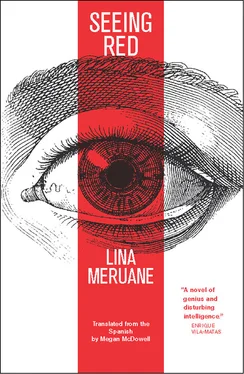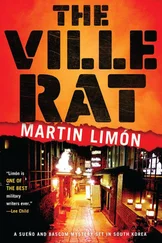Lina Meruane - Seeing Red
Здесь есть возможность читать онлайн «Lina Meruane - Seeing Red» весь текст электронной книги совершенно бесплатно (целиком полную версию без сокращений). В некоторых случаях можно слушать аудио, скачать через торрент в формате fb2 и присутствует краткое содержание. Год выпуска: 2016, Издательство: Deep Vellum Publishing, Жанр: Современная проза, на английском языке. Описание произведения, (предисловие) а так же отзывы посетителей доступны на портале библиотеки ЛибКат.
- Название:Seeing Red
- Автор:
- Издательство:Deep Vellum Publishing
- Жанр:
- Год:2016
- ISBN:нет данных
- Рейтинг книги:3 / 5. Голосов: 1
-
Избранное:Добавить в избранное
- Отзывы:
-
Ваша оценка:
- 60
- 1
- 2
- 3
- 4
- 5
Seeing Red: краткое содержание, описание и аннотация
Предлагаем к чтению аннотацию, описание, краткое содержание или предисловие (зависит от того, что написал сам автор книги «Seeing Red»). Если вы не нашли необходимую информацию о книге — напишите в комментариях, мы постараемся отыскать её.
This powerful, profound autobiographical novel describes a young Chilean writer recently relocated to New York for doctoral work who suffers a stroke, leaving her blind and increasingly dependent on those closest to her. Fiction and autobiography intertwine in an intense, visceral, and caustic novel about the relation between the body, illness, science, and human relationships.
Lina Meruane
Seeing Red — читать онлайн бесплатно полную книгу (весь текст) целиком
Ниже представлен текст книги, разбитый по страницам. Система сохранения места последней прочитанной страницы, позволяет с удобством читать онлайн бесплатно книгу «Seeing Red», без необходимости каждый раз заново искать на чём Вы остановились. Поставьте закладку, и сможете в любой момент перейти на страницу, на которой закончили чтение.
Интервал:
Закладка:
black box
(At night, headed north like weightless particles. Crossing the cloudy sky over the mountains. Cruising speed: eight hundred kilometers per hour. Ten or twelve thousand meters high. Minimum friction, minimum consumption of the oil that causes the wars you study. We were traveling in the pressurized and hermetic cabin unafraid of the windows exploding, or any bottles or our own circulatory systems. Cabins specially designed to prevent everything but thrombosis. Those seats don’t induce sleep, nor did the captain help, that loquacious pilot set on tormenting us with supplementary information: the height of the peaks and the cubic meters of pure water deposited in them, pure ice, he said, addicted to the loudspeaker. I don’t know if you remember the stewardesses interceding with a rolling cart of drinks, after which we heard the captain return to the speakers to point out, stentorian, that soon we would head straight northward, that we would pass along the heights and the desperate depths of the Bolivian natives, before landing in Lima, where we could get off the plane or not. That no one should feel pressured to visit the mestizos at the duty free — do you remember? the cholas wrapped in their skirts — not even to find out how much they still hate, with deserved hostility, us Chileans. The laughter grated in the microphone, and with that he wished us good night for good. Finally, he shut up, you said, dozing from the cocktail of pills you’d taken for vertigo or air sickness, for your fear of planes mangled in flight, your black-box anxieties. You’d taken out pills for acid reflux and you’d also swallowed those, without water. You put it all in your mouth without disgust and before the stupor knocked you out, you carefully took off your glasses and asked me to put them away. Do you remember that, Ignacio? I covered that head of yours with the blanket, and I also covered my own. Ignacio, I whispered, and I blew on your face, and then raising my voice I repeated your name and squeezed your arm. But you didn’t respond, you’d drugged your will away; you were as though dead, but a dead man who was completely mine. I rested your head on my shoulder and I went against the only rule you’d imposed on me. I was improvising as I went, running my fingers calmly, greedily, over your sleeping eyelids, feeling on my fingertips the soft touch of the eyelashes, feeling your skin opening and letting me touch the cornea, damp, rubbery, exquisite, and then my avid fingers ignited, they ignited but you didn’t realize it, and I couldn’t tell you now that I couldn’t stop. I separated your eyelids and I ran the tip of my tongue along that naked edge that I felt like my own nakedness, and soon I was licking the whole thing, I was sucking on your whole eye softly, with my lips, with my teeth, making it mine, delicately, intimately, secretly, but also passionately, your eye, Ignacio, until the stewardesses came down the aisle imposing breakfast on us and I thought you would wake up. They left and then came back to take away trays, and little by little you began to resuscitate. I felt you stir, stretch forward, rescue a smile, and sink a finger into my cheek. How’d you sleep? I asked cautiously, and you said with nostalgia and presentiment that it had been weeks since you’d slept like that, so deeply, so happy not to be anywhere, forgetting about a wait that was still gathering. If only it weren’t for your eye that was burning. It’s so irritated I almost can’t open it, and you cursed the plane’s dry air with your voice still somewhere else, rubbing the eyelid a bit and putting on the glasses I handed you. The plane touched down lightly and slid forward. I, on the other hand, didn’t sleep a wink, I told you, smiling with a sad happiness. I wove my fingers between yours and there we stayed, together, until all the passengers had left the plane and you stormed the aisle full of pillows.)
not the damnedest idea
Ipso facto, my mother would come. Not two days would pass, two or three days spent consuming another novel, me, and filling the refrigerator with food, Ignacio. But what am I saying? There was the work of preparing ourselves for the worst. Calls to the insurance company that doubtless would send us around in circles, to my thesis director to let her know my recovery promised to be long, the department head to put my registration indefinitely on hold, to the dean to beg him not to cut off my grant because I’d be left without insurance, and then. All delicate tasks, those and others we would undertake during those too-brief days in the muggy south of Manhattan. Visiting the eye doctor and bringing him an unlikely souvenir. Lekz made us wait while Doris demanded we fill out forms and hand over detailed descriptions of the situation in writing. I dictated to Ignacio. Yuku greeted me with her learned Japanese courtesy, but saved herself the bows before dropping in the paralyzing drops. My hand slid some fingers along the plastic petals of the plastic flowers in some pots of the same material, and returned to plant itself nervously on my knee while my body rocked slightly, forward, backward, like a tireless rubber doll. Stop doing that, Ignacio demanded or implored. Please, he said, stop rocking. I didn’t know why I was doing it, I didn’t realize I was until he pointed it out, maybe I did it to be sure I was still there, sitting in the chair. And I was still moving when Lekz came out of his office and approached me. He was standing in front of me, but he didn’t call me by my name but rather said, ceremoniously and mechanically, welcome back missus…Missus, I repeated mentally, realizing he had completely forgotten my name. Follow me, he said, like a false missionary, missus… ashamed, not daring to ask. Lucina, doctor, I told him officiously, knowing he’d be unable to pronounce it, while I reached out my hand, but you can call me Lina. He doesn’t know who the hell I am, I murmured then in Spanish to Ignacio, he doesn’t have the damnedest idea, this doctor to whom I’ve handed myself over in body and practically soul for two whole years. Ignacio pinched my arm because Lekz spoke a little Spanish, in addition to English and Russian. He understood something because his wife, an eye doctor like Lekz, had been born in Galicia, like Ignacio. It was all true, his pinch and Lekz’s wife’s Galician Spanish. It was also true that my doctor did not remember my name. I smiled at him like an African doll, showing all my teeth, showing my tonsils if I had to, and I said again to Ignacio. Not the damnedest idea. Lekz must have already been deep in his illegible notes, because suddenly he seemed to remember and he said, surprised and happy, weren’t you the writer? Aren’t you in Chile? We were, for a whole month, corrected Ignacio, self-importantly. We saw the city, she showed it to me, it’s not a pretty city at all, in fact it’s pretty ugly, though it does have its corners, and he stopped, suddenly uncomfortable at seeming ungrateful. I ignored him; I’d been thinking about the word writer next to a verb in the past tense, the past of the books I’d written and that I wasn’t sure I would go on writing. One eye would be enough, I thought for a second, until I felt Lekz’s fingers taking my hand like a dancer and leading me on tiptoe toward the chair crowned with lenses. I opened my eyes resolutely and I let myself be looked at through the same apparatus as always. And from there I moved to the reclining chair and I leaned my head back, giving myself to the most potent magnifying lens, exercising my neck, preparing my ear to hear that the blood had not dissipated. There even seemed to be more of it, and it could already be coagulating. I think, said Lekz, with a slight cough, and I could imagine him stretching his lips into one of his Russian grimaces. I think, he said again without rounding out his idea, I think these malignant veins have gone on bursting. I think, he said, thinking again, that hopefully you aren’t anemic, because the lack of iron would be an impediment to an operation. You will operate! I howled inside, you will operate, even if I’m dying. But Lekz went on thinking out loud, and next he asked, with calculated calmness, how have things? and I, without letting him finish, whinnied: good, very good, healthy as a horse, doctor. I’m full of energy, I could go to the operating room now carrying you on my shoulders. I’d carry you on my back or drag you, I’d take off running unchecked, wearing blinders so I wouldn’t be distracted, I’d barrel past the signs saying do not enter, I’d break the window of the operating room, jump onto the cot, I’d separate my eyelids with my own fingernails so you could stick in the blades, I’d offer myself to the needles strung with thread so you could finish sewing me up. You’ll need tests, he said, to rule out anemia. Tests! I don’t want tests. I want you to operate. Right now. But Ignacio got tangled up in my arm and he dragged me off to the laboratory and when we got there, in spite of his sqeamishness, he stood firm beside me: roll up your sleeve and stretch out your arm. And I obeyed, swearing vengeance, and I made fists so my veins would pop. Ignacio’s stomach turned when he saw how that blood of mine flowed, a blood that is always so like itself, my blood, like his but different only because it was mine, filling the tubes. And after the blood we went mutely to his apartment that was also my waiting room, which would be my mother’s campsite when she arrived the next morning to interrupt the peace of the worried. Of course you’ll have the operation, my mother reassured me as soon as she’d planted her high heel on the apartment’s only rug and hugged me. Don’t worry, dear, she repeated with absolute certainty, you have more than enough iron in you. They didn’t have to bleed you to know that. Look at her face, she said to Ignacio, look at her fingernails, and she squeezed my finger. And then, without warning me, she stuck her long nail in my lower eyelid. She turned it inside out. She peered into it and said, you see, Ignacio? It’s pink. That’s irrefutable proof, she said, still not letting go of that insensitive bit of hide. Ignacio was taking nervous steps over the bare tiles, pacing to get away from my mother who went on saying, these doctors are so specialized they don’t understand anything that’s happening in the rest of the body. Only in the organ they study. They don’t know anything. I agreed: they don’t have the damnedest idea.
Читать дальшеИнтервал:
Закладка:
Похожие книги на «Seeing Red»
Представляем Вашему вниманию похожие книги на «Seeing Red» списком для выбора. Мы отобрали схожую по названию и смыслу литературу в надежде предоставить читателям больше вариантов отыскать новые, интересные, ещё непрочитанные произведения.
Обсуждение, отзывы о книге «Seeing Red» и просто собственные мнения читателей. Оставьте ваши комментарии, напишите, что Вы думаете о произведении, его смысле или главных героях. Укажите что конкретно понравилось, а что нет, и почему Вы так считаете.












